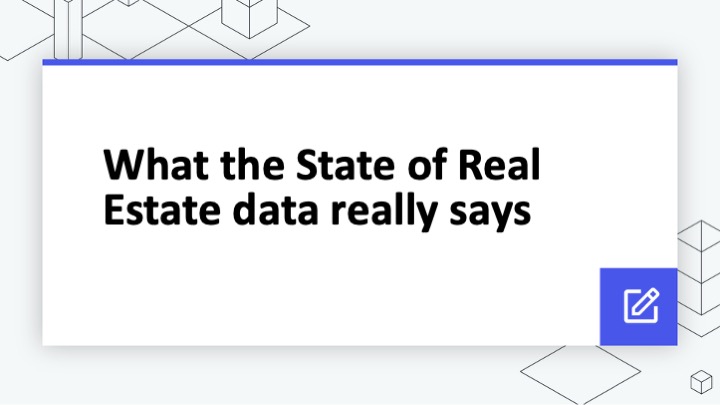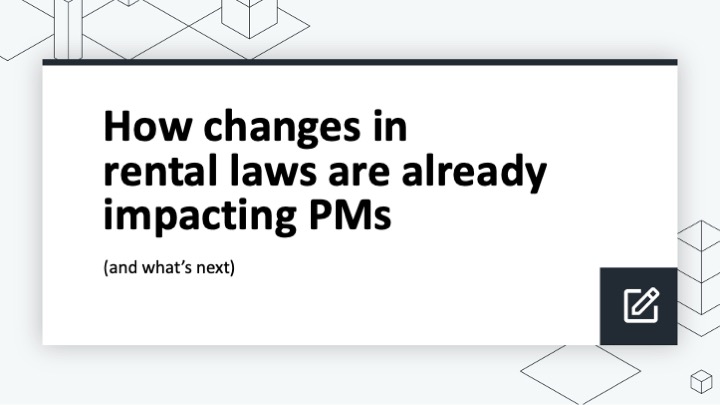Reapit in Australia & New Zealand

AI in Real Estate. From Automation to Agentic Intelligence.
AI isn’t just hype anymore, it’s already changing the way agents work. From cutting out admin to helping win more listings, here’s how automation, generative AI and agentic AI fit into real estate, and how Reapit is building AI to keep people at the centre.
Artificial Intelligence (AI) has moved from hype online and podcasts to reality at lightning speed. It’s no longer just a buzzword on the edge of the property industry. It’s already at work. From drafting listings to answering enquiries, AI is helping early adopters move faster, win more listings and capture market share while others are still asking whether it is ‘really worth it’.
For our industry, the opportunity is huge. Used effectively, AI removes friction from everyday tasks, giving you back time to focus on clients and relationships. But, with countless new terms, tools, and AI ‘one hit wonder’ claims hitting the market in recent times, it can be hard to separate promises from intangible value.
In case you missed it, the recent webinar with Reapit’s Heads of Product for Property Management Helen Morris & Data, Anne Porter, we explored:
- the difference between simple automation and true agentic AI,
- what ‘good AI’ looks like in practice, and
- why those who act now will set the pace for the future in the property industry.
So, what is “real” AI for Real Estate?
There are many misconceptions about Artificial Intelligence, not only in the real estate industry but surrounding AI altogether. With multiple AI tools available, with some claiming to be the ‘silver bullet’ for your business, it can be hard to understand what’s actually valuable, and what’s just automation labelled as AI.
Take this for inspiration.
Content that previously took agents hours to write, now takes seconds.
Agents are using AI to assist in drafting property descriptions, sales outreach emails and handling enquiries. Tools like ChatGPT are enabling agents to draft descriptions for properties within seconds, creating additional time for agents to spend on customer facing tasks.
As Helen explained in our recent webinar:
“From Property Management to Sales, AI is already reshaping how we operate in real estate, and it is here to stay.”
Simply put, AI is not replacing agents or your team, but simply removing friction in your agency to further enhance the performance of your team by handling tasks that previously took valuable time.
Anne put it succinctly:
“With great AI, your pipeline becomes more predictable. Your listings hit the market faster. This isn’t about removing people. It’s about removing friction”.
Generative vs Agentic AI, what’s the difference?
We know how valuable AI can be to an agency, but it’s important to note that there are different types of AI tools that perform vastly different tasks. Evaluating which of these tools is the best fit for your agency and the tasks you require it to assist you with is crucial in ensuring a seamless integration to your workforce.
Put simply, we’re seeing two main types of AI tools used within the property industry at the moment. Generative AI and Agentic AI.
Generative AI is what most people are likely familiar with already. Think ChatGPT, Claude or Jasper. These tools are used to assist in creating your content. As mentioned briefly earlier, this can be in the form property listings, website copy, outreach emails, images etc. This type of AI generates information for you based off a series of prompts you’ve put directly into the platform.
For example: You may ask ChatGPT to draft a property description of 150 words for a 3 bedroom house that has a pool, low maintenance yards & is close to the local shops.
The other type of AI we are seeing used more frequently this year is Agentic AI. This type of AI takes initiative, and executes tasks like a personal digital assistant. It doesn’t work based off a series of prompts that is given to it, it learns & acts from data that is fed to it from your agency.
As Helen put it in our recent webinar:
“Generative AI uses deep learning & prompts to give you text, images or code”.
Anne added:
“Agentic AI is a type of AI that doesn’t just give you information, it takes action to help you get things done. It doesn’t just create, it learns, takes initiative and completes tasks without being continuously prompted”
Automation vs Agentic AI. The real difference:
For years, most agents have relied on automation to keep the wheels turning. Automation can look like scheduled emails you’ve organised to be sent at a specific time, to calendar reminders and nurture campaigns. These tools are useful, but they only ever follow rules you’ve already set.
With the rise of agentic AI, systems don’t just react to triggers, they make decisions on your behalf. They read, interpret and act on information in real time, cutting out layers of manual work.
For an agent, that means moving from “I told the system what to do” to “the system worked out what needed doing, and did it”.
Anne highlighted in our recent webinar:
“Most of us have used automation for years, tools that are a fixed set of rules. For example, a tenant maintenance request handled automatically”
Helen added:
“Agentic AI reads the request, understands what kind of issue it is, prioritises it based on urgency, decides on the contractor, creates the work order and sends it directly”.
The shift is now from simply reacting to intelligently acting. From following instructions, to making informed decisions.
And this change in pace is allowing agents who take advantage of AI to surge ahead of their competitors.
Consumer shift towards conversational search
One of the biggest changes we’ve seen in buyer and tenant behaviour in recent months, is their shift towards conversational search. Tenants and buyers are moving beyond finding agencies via a simple Google search and are relying heavily on getting their information via AI-driven discovery.
Gartner predicts that by 2026, Google search volume will drop by 25%. Why? Because people are increasingly turning to AI platforms like ChatGPT to ask questions, explore options and make decisions.
Everyone is time poor, and consumers no longer have the luxury of browsing numerous websites that search engines recommend to find the information they’re after. A quick and direct question into an AI platform gives them the immediate information they require, without spending hours trawling the web.
In our recent webinar, Anne stated:
“This is dynamic conversational search and it’s changing the game. Agents will need to adapt to their marketing strategies to align with this new behaviour. That means optimising AI for discovery of your agency (and your own individual profiles), not just relying on previous SEO tactics such as Google rankings for consumers to find you”
Put simply, the rapid increase in consumer behaviour towards using AI as their primary search tool means that your agency will need to adapt and create a marketing strategy that prioritises AI driven discovery. Without this, your agency is missing out on qualified leads and enquiries that are likely to land in your competitor's hands.
The risks of bad AI
As wonderful and helpful as AI platforms can be, it’s important to ensure that the content you’re creating with AI needs to hold credibility and avoid appearing robotic, bland or misleading in nature.
The biggest risk in AI, is bad AI. It can be detrimental to your business if you use generative or agentic AI without fact checking the content it produces or ensuring that it’s operating in a way that is organic to your agency.
As with most tools, the quality of the work that comes from AI platforms is due to the data and the prompts that you feed it. If you give AI poor quality prompts that are bland or vague in nature, the quality of the content you get back will reflect this and therefore, your agency.
Anne stated in our webinar:
“This can make every agency sound the same – bland, robotic and forgettable”.
It doesn’t just waste time, it risks damaging your reputation, eroding client trust and leaving your agency behind those who choose to use AI tools that are built for accuracy, accountability and real estate specifically.
Reapit’s AI Roadmap (RAI)
The approach Reapit is taking to AI is very deliberate. We’re focused on building tools that deliver real operational value. As Anne explained in the webinar:
“RAI isn’t a bolt-on or a novelty. It’s being designed to sit natively & securely inside the platform that agents already use every day. That means it will work with the data you already have, support the workflows you already rely on, and enhance the systems your team trusts”
It’s important to call out that RAI isn’t about replacing agents. Helen made it clear during the session “AI can accelerate the work, but empathy builds the relationships. Real Estate is, and always will be, a people business”.
AI should be designed to support, not replace the agent-client relationship, and that’s exactly what RAI is being designed to do. Agencies that will win in a world of AI are those who use technology to manage the process, while humans manage the people.
More detail about RAI will be unveiled at Reapit’s upcoming product events this Summer and Autumn.
You can register your interest for early access to Reapit AI email : reapitai@reapit.com




.png)
